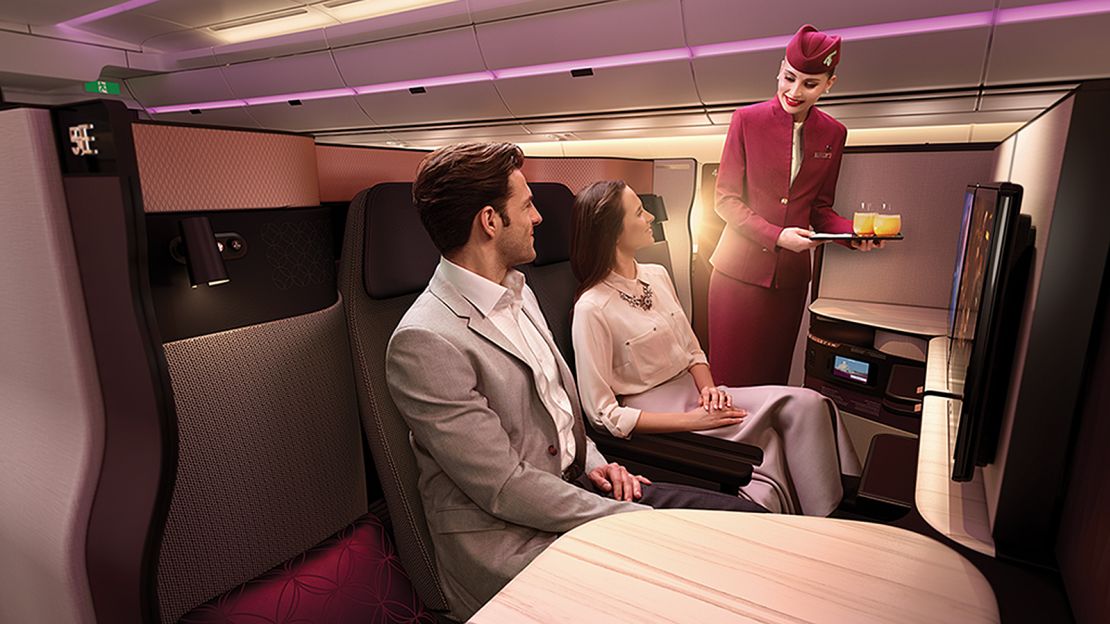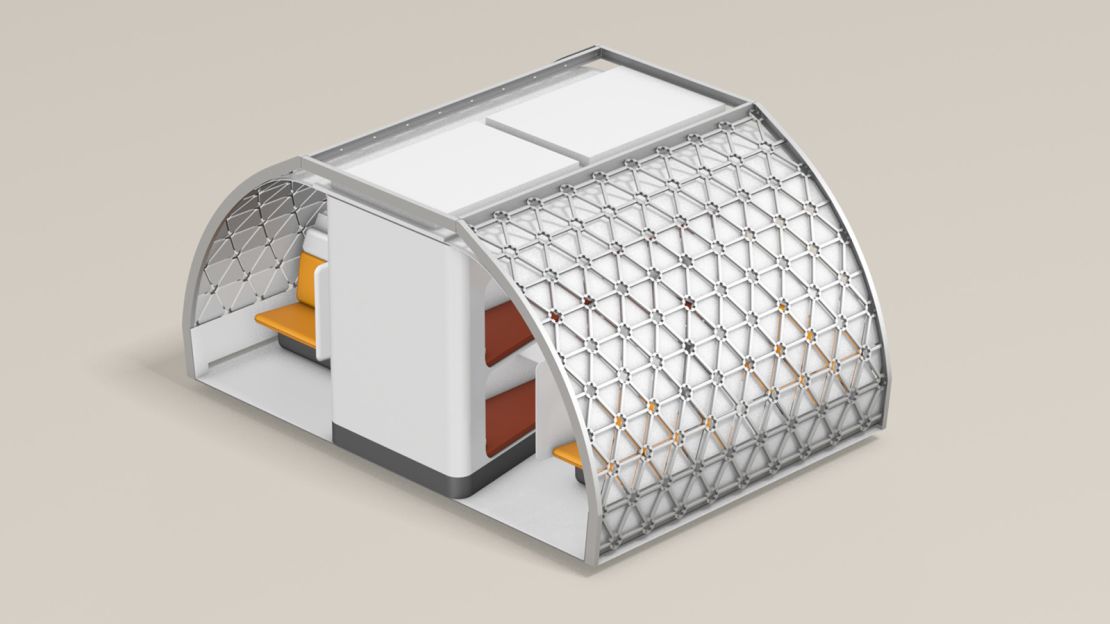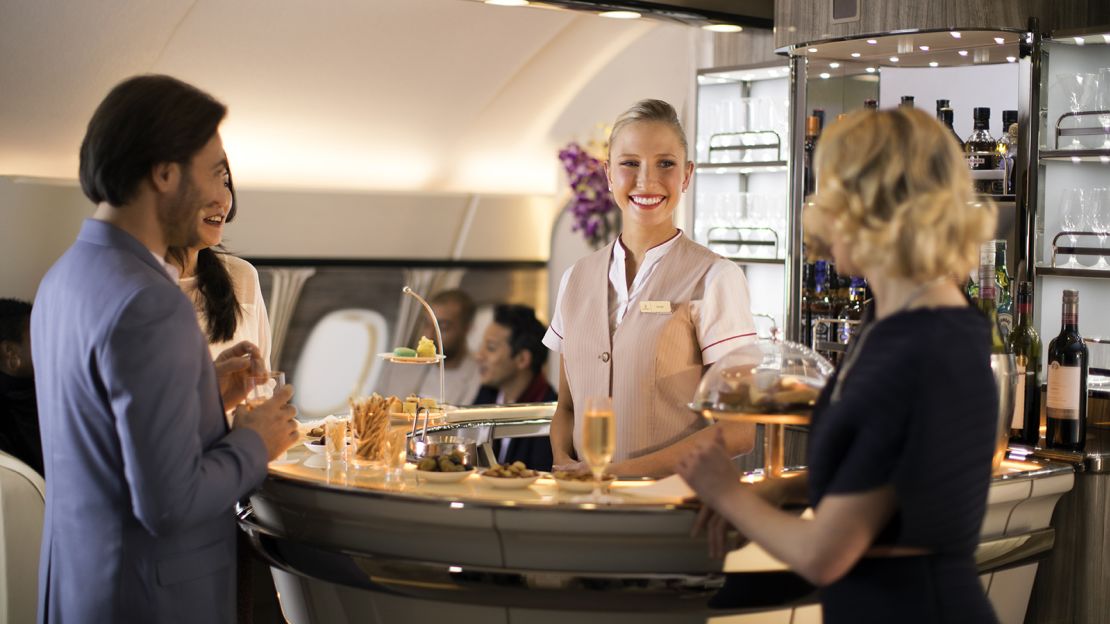Flying is about to get a lot more fun.
New advances in business class travel combine customizable touches with sociable settings, not unlike the spacious lounges and cozy couches of planes in the 1960s and ’70s.
The latest design concepts feature customizable group-seating pods, sleek lounge bars and, soon enough, co-working spaces – all at 35,000 feet.
These changes come with a trend toward experiential travel, in which “authenticity and personalized experiences” are key components of a fulfilling journey, according to a 2016 US Experiential Traveler Survey by travel industry intelligence platform Skift.
From Qatar Airways’ new QSuite group-seating arrangements to Airbus’ proposed adaptable modular planes, air travel is entering a new era of personalization and socialization.
“Beyond premium cabins, I see a continued trend of more opportunities for passengers to engage socially with others,” Ben Schlappig, travel consultant and founder of One Mile at a Time aviation blog, tells CNN.
“KLM (Royal Dutch Airlines) took the first step towards that with [its] Meet & Seat concept – where you can pick out a seatmate based on their social profiles.”
“While I don’t exactly see that type of service growing, I think airlines will find more opportunities to let passengers engage with one another – but only when they choose to, of course.”
READ: Flight attendant uniforms and the designers who created them
Party of four

Most modern business class pods have been designed for solo travelers, who generally prefer privacy and personal space.
“Airlines have invested billions of dollars in these types of private, cutting-edge seat designs,” says Schlappig.
“But as airlines do everything they can to optimize revenue, they’re finding that there are more leisure travelers willing to pay for first and business class seats.”
For those traveling with family, friends – or even work colleagues – the panels thwart conversation and collaboration.
Answering a call for more flexible arrangements, Qatar Airways recently debuted a business class seating design reminiscent of a train cabin – albeit with quite a few more bells and whistles.
Unveiled in March at the ITB Berlin exhibition – the world’s largest tourism trade fair – the new QSuites enable groups of four to sit together.
Essentially, pairs of seats face each other, creating a cabin-like arrangement.
Adjustable privacy panels enable travelers to open the space and create the feeling of a private cabin for parties of two or four – or close off the pod completely to travel alone.
Those flying with friends or colleagues may appreciate the group option – making it easy to work on projects, watch TV or swap stories.
Put the privacy panels back down, and each pair of leather seats can convert into a single bed – or a double bed with all panels removed.
“What makes this new seating arrangement so brilliant is that you can have full privacy at each seat if you prefer, or you can turn the center section of four seats into a social area,” adds Schlappig.
“We’ve never seen an airline offer such customization in a premium cabin before, and I imagine many airlines will take note of that.”
The new suite designs will begin appearing in Qatar Business Class cabins as early as June.
MORE: Luxury jets whisk VIPs to their destinations in flying palaces
New social order

What if the planes of the future could be customized, cabin by cabin, to include a mix of spas, sleeper capsules, cafes, cycling studios and co-working spaces?
That’s exactly what Airbus envisions with its next airliner, estimated to debut within a “matter of years.”
Dubbed Transpose, the modular cabin architecture is all about flexibility – both for airlines and flyers.
“Personalization is something consumers expect universally. They can tailor anything from their phone to a coffee order to a loan online,” Jason Chua, project executive at A³ by Airbus Group, tells CNN.
“Airlines are responding to that desire for customization, but right now there are significant limitations to bringing a similar level of choice to commercial air travel – even the smallest change in an aircraft cabin can take anywhere from seven to 10 years.”
To streamline such changes, Airbus takes inspiration from already existing freighter modules, which are switched in and out upon landing.
“Transpose doesn’t require a completely new aircraft or the fundamental redesign of airport infrastructure,” says Chua.
Instead of spending decades on designing an entirely new aircraft, Transpose cabins aims to enable airlines to quickly diversify and customize their aircraft – not to mention add revenue streams.
Modular cabins would swap in and out, according to the route and customers. For example, an overnight Hong Kong to New York City flight would likely be full of sleeping cabins and perhaps a dim sum restaurant.
But on its next leg, the same plane might switch to a new arrangement – spas, co-working spaces and coffee shops – for daytime travel.
READ: Airplane seat patents that will make you gulp
Mix and mingle

Not quite as revolutionary, but still a boon for extroverts around the world, Emirates plans to launch a new iteration of its signature A380 Onboard Lounge this July.
“Our passengers, particularly long-haul flight travelers, are looking for a space to relax and socialize while flying,” says Terry Daly, Emirates’ senior vice president of service delivery.
“In our latest revamp, we have taken inspiration from private yacht cabins … and we have managed to increase the seating space while keeping the signature U-shape.”
Capturing the look and feel of an executive club, the spacious Business Class cocktail bar and lounge incorporates champagne hues, bronze accents, LED mood lighting, surround sound and lots of shiny wood.
First introduced in 2008, the lounge concept was one of the first of its kind to offer travelers a chance to mix, mingle, stretch their legs – or catch a sports game.
“Airlines are doing a better job of recognizing that different passengers have different needs,” adds Schlappig.
“They are trying to make it easier to socialize with the people you’re traveling with, and even to make new friends along the way, given that meeting new people is often the best part of travel.”
MORE: Southern Lights put on show for passengers on special flight
Kate Springer is a Hong Kong-based freelance journalist who covers food, travel, culture, architecture and innovation for CNN, BBC Travel, Forbes Travel Guide, Fodor’s, Munchies and more. Follow along on Instagram and read more of her work here.











